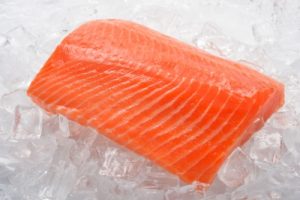 Does mercury in fish lower our testosterone?
Does mercury in fish lower our testosterone?
I get asked about the risks of eating fish contaminated with mercury quite often, but this isn’t always an easy question to answer, because it depends on the type of fish you’re eating and how often you eat it.
We’ll get to the bottom of this before we’re finished here, but first, let’s talk about mercury itself and what kind of damage it can do to your body, including its impact on your testicles and your ability to produce testosterone.
The most important thing you need to know is that mercury has a strong affinity for the leydig cells in your testicles, so when you ingest too much, it actually accumulates in your testis and does damage to these testosterone producing machines.
And one group of researchers demonstrated this a while back…
What they did was take 20 rats, which they split into two groups. Group one was given plain tap water, while the other group was given tap water laced methylmercury.
At the end of the trial the researches wrote this:
“Our results showed a dramatic fall in the plasma testosterone in the contaminated animals.
The concentration of testosterone in seminiferous tubules fluid dropped about 55% in the poisoned animals in comparison with the controls.”
So testosterone concentrations in the seminiferous tubules of the rats who were exposed fell by more than half, when compared to the controls who were given none.
In another trial, mercuric chloride was given to several different animal species, including rats, mice, guinea pigs and hamsters.
After the 30 day study period ended, the animals were sacrificed and examined by the scientists to determine how the mercury had impacted gonadal function.
Quote:
“Testicular degeneration and cellular deformation was observed in both the seminiferous tubules and the Leydig cells in all species.
A significant decrease of testicular weight also resulted.”
So testicular degeneration, a decrease in testicular weight, along with cellular deformation of the leydig cells and the seminiferous tubules, all due to excess mercury exposure.
Next…
In a human trial, researchers discovered that when human sperm was exposed to mercury, less than 5 percent of the spermatozoa were still motile after 30 minutes.
Humans exposed to mercury also experience reduced sperm counts, suppressed testosterone levels, low libido and even impotence in some cases.
So now that we’ve established the fact that this heavy metal can do some serious damage, let’s talk about how you can still eat your fish, while keeping your mercury intake well within the safety zone.
Mercury Concentrations Of Common Fish Species
The type of fish that contains the most mercury are normally large, marine, deep water animals that eat other fish as opposed to plants or plankton.
This is the case because these larger fish typically live for a very long time, especially when compared to much smaller fish who operate lower on the food chain. For example, an orange roughy can live up to 149 years, giving it plenty of time to saturate its tissues with mercury.
And it’s this combination of long life, which gives them decades to ingest mercury, combined with the fact that they eat other fish, whose tissues also contain mercurius, that makes them so toxic.
Here’s a rundown of the contamination levels of different fish species, listed from highest to lowest…
High Mercury Fish:
- Shark
- Marlin
- Tilefish
- Swordfish
- Tuna (Ahi)
- King mackerel
- Orange Roughy
I avoid these fish entirely, because the risk of running into mercury a saturated animal is just too high.
Moderate Mercury Fish:
- Marlin
- Halibut
- BluefishGrouper
- SablefishWeakfish
- Chilean Seabass
- Spanish Mackerel
- Striped Bass or Rockfish
- Tuna (Canned Albacore, Yellowfin)
I’ll eat these fish on occasion, maybe once or twice a year, but I definitely don’t make a habit out of it.
Low Mercury Fish:
- Crab
- Carp
- Trout
- Squid
- Skat
- Scallop
- Croaker
- Snapper
- Monkfish
- Flounder
- Whitefish
- Jacksmelt
- Skipjack tuna
- American shad
- Freshwater perch
- Boston or Chub Mackerel
Canned light Skipjack tuna is included in this list, as it’s a smaller tuna species which is usually caught using the hook and line method.
So if you eat tuna out of a can, make sure it says Skipjack on the label, because this species usually contains low levels of Mercurius.
Very Low Mercury Fish:
- Sol
- Hake
- Perch
- Mullet
- Tilapia
- Pollock
- Catfish
- Herring
- Pollock
- Salmon
- Sardine
- Crayfish
- Haddock
- Flounder
- Anchovies
These fish typically test out very low, although this doesn’t guarantee that they don’t have any contamination with other heavy metals or environmental pollutants.
So, if you get your fish from clean, reliable sources, you can feel pretty safe eating these once or twice a week.
References:
- Effect of Organic and Inorganic Mercury on Human Sperm MotilityDOI: 10.1111/j.1600-0773.1991.tb01267.x http://onlinelibrary.wiley.com/doi/10.1111/j.1600-0773.1991.tb01267.x/abstract
- Toxic Effect of Mercury on Testes in Different Animal species.Indian J Physiol Pharmacol. 1982 Jul-Sep;26(3):246-9.
- Accumulation of Mercury and Its Effects on Testicular Functions in Rats Intoxicated Orally by MethylmercuryAndrologia. 2011 Feb;43(1):23-7. doi: 10.1111/j.1439-0272.2009.01003.x. Epub 2010 Nov 28.
